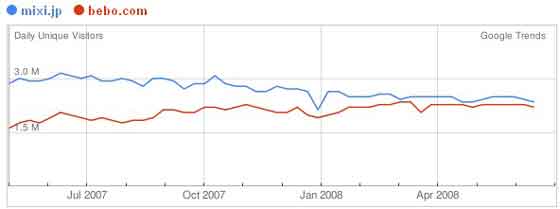Japan’s biggest social network is called Mixi, launched in February 2004 by the company of the same name. Drawing in one in five web users in the country, Mixi now boasts over 15 million members. The site ranks sixth on Alexa Japan and racks up over 14 billion page views monthly. Google Trends for Websites shows the Japan-focused service attracts more visitors than Bebo on a worldwide basis (about 2.3 million daily, see chart below).

Compared to leading Western social networks, Mixi is rather scarce function-wise (see the screenshot below). However, here are the main country-specific differences why MySpace, Facebook or Bebo don’t stand a chance in Japan:
- Restricted membership to increase the level of safety: Officially, every member must be over 18 years old. Mixi also requires an invitation from a current user and a Japanese mobile mail address to register.
- Blogging and communication as the big ideas: Next to resyndicating external blogs, members excessively write and share so-called “diaries” on the site. Instead of focusing on messaging, status updates and news feeds, Mixi established itself as one of Japan’s biggest blogging platforms. The site also offers more than 2.5 million user-generated bulletin boards.
- Marginal approach to design and structure: It’s almost impossible for users to change the layout and look of the site, which is only available in Japanese. External applications are not allowed. One of Mixi’s most striking characteristics is the scantiness regarding functions and features.
- High level of anonymity: Mixi abides by the preference of Japanese people to generally stay totally anonymous online. The number of members using real names and photos is below 5%. Very important for Japanese users: The so-called ashi ato (footprint) function makes it possible to retrace every visitor on profile pages, improving the feeling of personal security.
- Tailor-made mobile version: Users accessing Mixi’s mobile version have been clearly outnumbering those going through PCs since July 2007 (ratio of pageviews in March 2008: 60% mobile to 40% PC).
Another point making Mixi stand out is that the service generates relatively robust revenues. As the world’s first Web 2.0 company, Mixi went IPO on the Tokyo Stock Exchange in September 2006. Market capitalization currently stands at $970 million, bringing the company close to LinkedIn’s $1 billion value.
Mixi Inc. operates a profitable online employment site called Find Job!, mainly for IT-related job openings. For the fiscal year ending March 2008, sales on Mixi ballooned from $36.5 million to $82.4 million on a year on year basis. Find Job! alone contributed another $11.6 million. Net profits for the company as a whole grew 79.9% to $19 million in the same time frame.
While userbase and financial data don’t stack up against leading Western social networks in absolute terms, Mixi’s performance is still impressive given they operate in Japan only. Revenue per member stands at $5,46 for Mixi, which is 13 times more than Bebo ($20 million) and 3 times more than Facebook ($150 million). Including Find Job!’s contribution, Mixi also dwarfs Bebo in profits per member ($1.26 versus $0,1 for each of Bebo’s 50 million users). Based on the average Internet advertising spend per person, Mixi ranks 8th in the Techcrunch ranking of the real value of social networks.
The position as a quasi-monopolist is based on a horizontally and (to a lower level) vertically diversified business model.
Users can opt for premium membership ($3 month per month, i.e. to get additional storage space), generating revenues which account for 7% of the total sales.
The lion’s share of revenues comes from other sources. Based on a audio player plugin, users can share and buy every song listed in Mixi’s music section via iTunes or are directed to online retailers to order the CD. In addition, “Mixi Radio” was launched this month, a music streaming service that is partly fee-based.
Users have also contributed tens of thousands of reviews on books, CDs, DVDs etc. in Mixi’s “Reviews” section. Each of these articles contains affiliate links to online shops.
The site makes additional money with traffic referral to Yahoo! Japan search and targeted display and text ads. Mixi is also frequently collaborating with Japanese companies, which run promotion campaigns on the site.
MySpace (Alexa Japan’s No. 81) and Facebook (not in the Top 100) are trailing in Mixi’s home market, even though they established translated – yet not localized – versions in November 2006 and May 2008, respectively. On the other hand, Mixi’s price for success is that it’s Japan-focused approach to design and funcionality renders scaling on an international level next to impossible. The company recently expanded to neighboring China but in its current form, Mixi might be better off continuing to skim the Japanese market